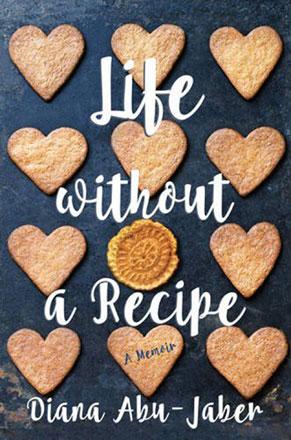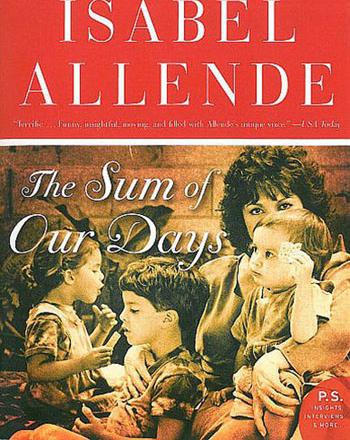You are here
Memory in the present tense
By Sally Bland - Feb 05,2017 - Last updated at Feb 05,2017

Life without a Recipe
Diana Abu-Jaber
New York: W.W. Norton & Co., 2016, 267 pp
In “Life without a Recipe”, Diana Abu-Jaber combines her memories as daughter, granddaughter, writer, cook, wife and mother.
More than a chronicle of events, this memoir is a rollercoaster ride of feelings, an accumulation of the diverse influences that make her who she is, and an intimate diary of her interaction with people and places.
While the when’s and how’s of happenings are often left vague, there are detailed accounts of particular moments of joy, sorrow or insight, rendered tangible by the author’s magical prose.
This is a memoir written by a person who loves life without thinking she must present it through rose-colored glasses. Irritation at her Jordanian father, Gus, for being so overbearing, is often mentioned.
Long pages are devoted to the open antagonism between him and Grace, her maternal, German-American grandmother. (Their predominance is such that Diana’s mother hardly gets a voice till towards the end.)
Caught in the middle of their cultural wars, getting contradictory signals and advice, Diana found it hard to chart a clear path to what she wanted; she was relegated to living “life without a recipe”.
Straddling the divide, plus witnessing Gus’ life-long yearning for Jordan, even as he preferred living in the US, is certainly what gave Diana her double-cultural identity.
Yet, for all their arguments, Gus and Grace loved and respected each other, even if they only showed it grudgingly. So, Diana also learned that love does not preclude conflict, nor vice versa; one must embrace life passionately, and not be afraid of friction.
Such understanding seems to have unleashed her creativity, enabling her to see things from unaccustomed angles and record them in original imagery. It also informs the honesty of her writing. It takes courage to write a memoir of this type, to reveal one’s doubts and mistakes, while one is still in the middle of life.
The advantages of “life without a recipe” for writing are apparent: “You start out with one sort of plan for how this or that story will go; along the way, however, it forks, doubles back. If you’re easy about it, you learn to follow the tales instead of the other way around”. (p. 52)
She is also able to weather the twists and turns of her personal life, narrating without rancour her two failed marriages that preceded meeting her third husband and soul mate, Scott.
She candidly relates her uncertainty over whether to have a child — would it end her writing career? — and how challenging motherhood is, but again she is able “to be easy about it”, seeing little Grace as “our beautiful mystery, a storybook placed on our laps”. (p. 135)
With Diana’s whimsical touch, awkward situations are rendered hilarious, and everyday activities become high adventure. She expresses deep emotions and values without resorting to platitudes, and deftly colours her descriptions of places and nature with her mood.
Not having a recipe does not, however, shield her from heavy, protracted grief at the death of her father.
“So many ways to write the grief story, through tears or dreams or memories. Or houses or cakes. Losing my father is, for a while, like losing my home in the world… A hundred thousand ways to avoid grief — and each of these ways, it turns out, is a kind of grieving. Sorrow comes, transmuted or not, water through the barricades.” (p. 245)
Food was the favourite battlefield of Grace and Gus — she specialising in sugary baked goods, and he preferring the salty, meaty flavours of Arabic food garnished with lots of vegetables.
Food is a recurring motif in the book, the site of conflict but also of pleasure, love and sharing.
Thus, it comes as a shock to Diana when her doctor, concerned about her blood pressure, warns her off sugar, sending her to hear a lecturer who proclaims: “Food is not entertainment or comfort or pleasure or love or distraction” — a reversal of all she thinks she has learned about life in the food field. (p. 252)
Having followed her grandmother’s example of bonding with her daughter by baking together, Diana meets yet another fork in the road and must reinvent her cuisine.
“Life without a Recipe” is about clinging to family and wanting to be free of family; it is about making a new family.
It is about the writing process — what blocks it and what pushes it along. It is about how one is affected by one’s surroundings, and vice versa.
Above all, it is about how a person’s memories affect them in the present tense, not dictating behaviour but pointing to possibilities — recipes yet to be written.
Related Articles
This is the sequel to “Paula”, the memoir Isabel Allende wrote in response to the tragic death of her daughter in 1992.
The Weight of ParadiseIman HumaydanTranslated by Michelle HartmanMassachusetts: Interlink Books, 2016Pp.
My Grandmother: An Armenian-Turkish MemoirFethiye CetinTranslated by Maureen FreelyLondon-New York: Verso, 2012Pp.












